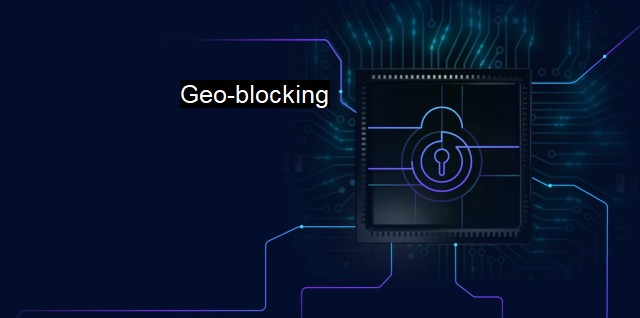What is Geo-blocking?
Exploring Geo-blocking: Implications for Cybersecurity and the Role of Antivirus Software
Geo-blocking is a practice that is commonly associated with cybersecurity and antivirus. It refers to the method where access to internet content is restricted based upon the user's geographical location. This circumstance arises when a network verifies the user's location via their IP address. Businesses, institutions, and organizations often utilize this strategy to control access to their online content.The fundamental reason to use geo-blocking is to maintain adherence with local legal and cultural norms, business strategies, and licensing issues. For instance, content streaming providers like Netflix, BBC iPlayer, or Hulu use geo-blocking to enforce their copyright licensing agreements, which stipulate where the content can be viewed. Limiting access based on location also allows companies to implement price discrimination to maximize profits. software and digital content often fluctuate in price between regions.
Within the scope of cybersecurity, the usage of geo-blocking is pivotal in places where cybercrime activity is rampant or where strict internet regulations are in place. Cybersecurity administrators can pre-emptively block IP addresses originating from these locations to mitigate threats. If an organization detects a cyber threat from a specific geographic location, administrators can curtail access from that region altogether, making geo-blocking an effective defense against equity and democracy exploitation and cyber attacks. Besides, systems administrators running web applications or online services can also use geo-blocking as a defense in-depth strategy to add an extra layer of security in addition to firewalls and antivirus software.
Geo-blocking is a usable defense mechanism, but it's not flawless. Skilled hackers can mask their geographical location by utilizing Virtual Private Networks (VPNs) or proxies to bypass geo-restrictions. VPN can 'trick' the systems into believing the user is accessing from a different geographical location, causing the geo-blocking mechanism to allow access. Consequently, despite offering a useful first line of defense, geo-blocking should be utilized in conjunction with other cybersecurity measures.
Light must be shed on the fact that geo-blocking has multiple non-security-related uses. Online marketers also use geo-blocking to tailor web content and advertising to specific geographic locations, creating location-based marketing strategies and increasing conversion rates. Still, such marketing practices also lead to issues like data privacy, making geo-blocking a mixed blessing.
Geo-blocking practices are prone to criticisms, primarily relating to internet freedom and neutrality. the concept of a global, free-access Internet is at odds with geo-blocking. Critics argue that the practice can limit the free flow of information, hamper global communication, and cost economies by stifling innovation. In response to these criticisms, back in 2018, the European Union introduced new rules to help do away with geo-blocking to boost its Digital Single Market strategy.
Another essential thing to note is that the accuracy of geo-blocking is questionable. Less sophisticated geo-blocking mechanisms often use the assigned IP address to estimate the location, leading to potential inaccuracies. Every device connected to the internet has an IP address, and these can be misleading due to proxy servers and VPNs. As a result, geo-blocking, while useful under certain circumstances, may incorrectly block legitimate access or allow illegitimate access, making it something of a blunt instrument.
Geo-blocking is a widely used tool for various cybersecurity and business purposes, especially those involving access control, defense against cyber threats, licensing purposes, and targeted marketing. Although it offers some benefits and is often critical from a business and security standpoint, it does have its downsides. Optimal usage of geo-blocking should involve balancing its usefulness in security with respect for global free-access principles. it should be used in conjunction with other types of cybersecurity safeguards to ensure the wholesome safety of data.

Geo-blocking FAQs
What is geo-blocking?
Geo-blocking is a technique used by websites, services, and online platforms to restrict access to their content based on the geographical location of the user.Why do websites use geo-blocking?
Websites use geo-blocking for a variety of reasons, including complying with different laws and regulations in different countries, restricting access to content that is not licensed or authorized in certain regions, and preventing cyber attacks and fraud.How does geo-blocking affect cybersecurity?
Geo-blocking can help improve cybersecurity by preventing unauthorized access to websites and online services from countries or regions that are known for cyber attacks or fraudulent activities. However, it can also make it more difficult for security researchers and professionals to access and analyze malicious content and online threats.Can I bypass geo-blocking for antivirus and cybersecurity purposes?
It is possible to bypass geo-blocking for antivirus and cybersecurity purposes using virtual private network (VPN) services or proxy servers. However, it is important to make sure that you are using a reliable and secure VPN service that has strong encryption and does not log your online activities.| | A | | | B | | | C | | | D | | | E | | | F | | | G | | | H | | | I | | | J | | | K | | | L | | | M | |
| | N | | | O | | | P | | | Q | | | R | | | S | | | T | | | U | | | V | | | W | | | X | | | Y | | | Z | |
| | 1 | | | 2 | | | 3 | | | 4 | | | 7 | | | 8 | | |||||||